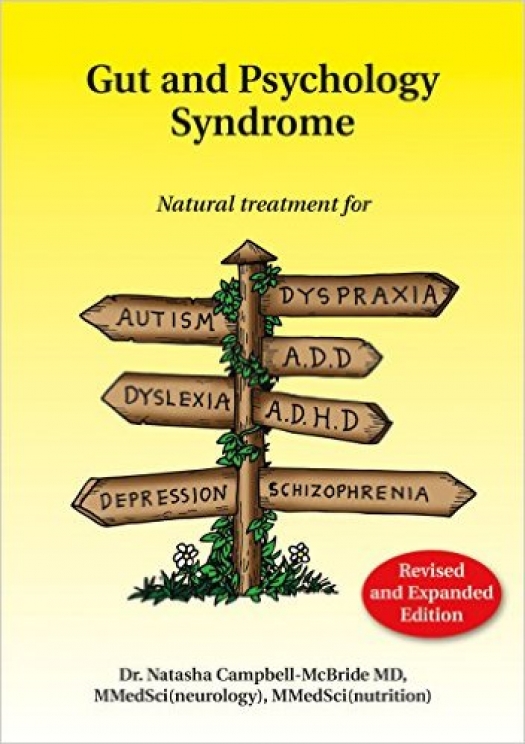Conference
- Event: 2010 Weston A. Price Foundation Conference
- Speaker: Dr. Natasha Campbell-McBride
- Attendee: Kris Olson, L.Ac Dip.OM
natashacampbellmcbride.jpg

Natasha Campbell-McBride, MD, MS
At this year's Weston A Price Foundation Conference, Dr. Natasha Campbell-McBride presented her material on GAPS: Gut and Psychology Syndrome.
Dr. Campbell-McBride graduated with Honors as a Medical Doctor in 1984 from Bashkir Medical University in Russia. In the following years she earned postgraduate degrees in neurology and nutrition. After practicing for several years she and her family moved to the UK. Soon after, her son was diagnosed with autism, which prompted her research in that area. It was during this time that Dr. Campbell-McBride developed her theories on the relationship between neurological problems and diet. Having treated her son of the autistic spectrum, Dr. Campbell-McBride returned to practice in 2000 and now runs the Cambridge Nutrition Clinic. She specializes in using nutritional approach as a treatment, and has become recognized as one of the world's leading experts in treating children and adults with learning disabilities and other mental disorders, as well as children and adults with digestive and immune disorders.
gutandpsychologysyndromebkcvr.jpg

Gut and Psychology Syndrome: Natural Treatment Of Autism, ADHD, Dyslexia, Dyspraxia, Depression And Schizophrenia by Dr. Natasha Campbell-McBride
In 2004 she published her first book Gut and Psychology Syndrome. Natural Treatment Of Autism, ADHD, Dyslexia, Dyspraxia, Depression And Schizophrenia where she explores the connection between the patient's physical state and brain function. The book gives full details of the GAPS Nutritional Protocol, highly successful in treating patients with learning disabilities and other mental problems. At the end of 2007 her second book was published: Put You Heart In Your Mouth! What Really Is Heart Disease And What We Can Do To Prevent And Even Reverse It.
In the course of her work, Dr Campbell-McBride discovered that most of her patients with learning disabilities also had serious physiological maladies, often auto-immune related. According to her theory, all disease begins in the gut. Gut flora, especially, plays a key role in human health and it's a subject that until recently has been virtually ignored by most mainstream medical professionals. Our gut flora is precious! It protects us from pathogens, aids in digestion, assimilation and absorption, modulates the immune system and aids in detoxification. Our gut flora can become compromised by many things including antibiotics and other drugs, toxins, chlorine in the water supply, illness, pollution, radiation, stress, age, and others.
Problems with gut health can begin with the infant in-utero. The mother's gut flora is often compromised because of the factors noted above, so healthy flora are not passed on to the fetus. After birth, the typical infant problems of infections, antibiotics, over vaccination, poor food-weaning and other issues can arise and the road to poor health begins. As the child develops, the lack of beneficial flora can lead to a damaged and more permeable gut wall that cascades into malabsorption, food allergies, toxicity, immune system decline and possibly auto immune disorders.
Dr. Campbell-McBride went on to explain how toxic by-products affect other parts of the body like the liver and the lung; leading to allergies, asthma and even long term lung damage. The body tries to eliminate toxins through the lung, skin, urinary tract and mucus membranes. If these detox pathways are compromised, asthma, eczema, chronic cystitis, chronic sinusitis, frequent colds, diarrhea, constipation, and irritable bowel will likely follow. The absorption of protein and toxins through the damaged gut wall can pollute the blood as it crosses the blood-brain barrier. This can subsequently lead to depression, learning disorders, substance abuse, and a host of psychological issues. This is how we arrive at the link between gut and psychology.
Dr. Campbell-McBride developed the GAPS diet to address these problems. The GAPS nutritional protocol focuses on eliminating all grains, starchy vegetables, pasteurized milk products, white sugar and other sweeteners, processed foods and food additives. One is encouraged to eat a diet of fresh meats and fish, fruits, vegetables, healthy natural fats, nuts, seeds and fermented foods. The dietary plan provides recommendations for phasing in the diet as well as particular protocols for constipation, diarrhea and other specific symptoms. Finally, several case studies are presented that demonstrated how physical illness and psychological disorders can be eliminated after a period of improved dietary habits.
You can read more about Dr. Campbell-McBride on the GAPS Diet website.


